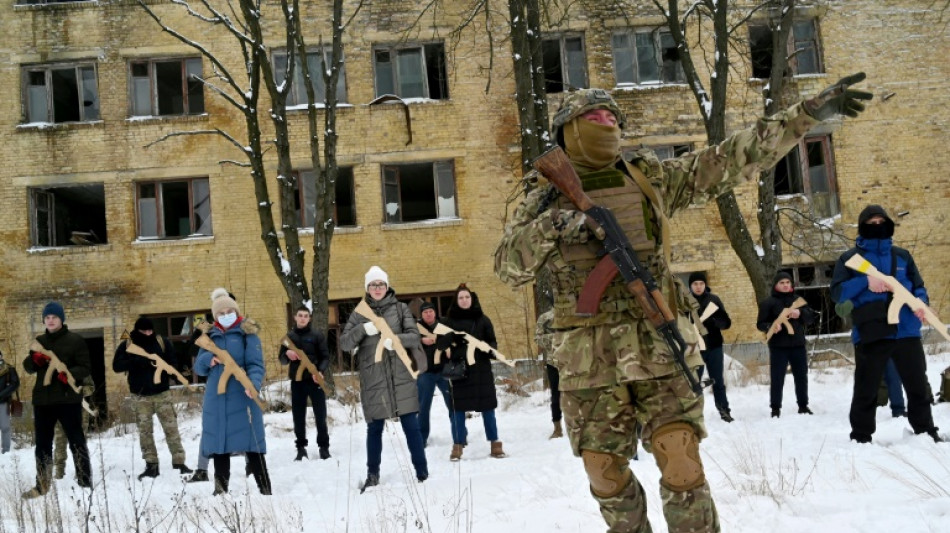

Russia, US square off at UN over Ukraine crisis
Russia and the United States face off Monday at the UN Security Council over Moscow's troop buildup on the Ukrainian border, as Western nations intensify their high-stakes diplomatic push to avert open conflict in Europe.
With tensions soaring, the United States has declared itself ready to push back against any "disinformation" Moscow put forward in what is expected to be one of the most closely watched United Nations sessions in years.
The US-requested Council meeting, at 1600 GMT, comes as fears grow of an imminent incursion into Ukraine, despite Kremlin denials.
Russia was expected to try to block the 15-member Council from holding the meeting at all -- with its envoy to the UN on Monday calling it part of a US bid to whip up "hysteria" over Ukraine.
But Washington's UN envoy Linda Thomas-Greenfield has insisted "the Security Council is unified."
"Our voices are unified in calling for the Russians to explain themselves," she told ABC News Sunday. "We're going to go in the room prepared to listen to them, but we're not going to be distracted by their propaganda."
"And we're going to be prepared to respond to any disinformation that they attempt to spread during this meeting."
In parallel with the UN talks, US Secretary of State Antony Blinken was preparing for fresh talks Tuesday with Russian counterpart Sergei Lavrov -- the latest of a flurry of diplomatic contacts between Moscow, Washington and Brussels over Ukraine, and broader European security concerns.
- 'Putin will not stop' -
The United States and its allies have ramped up joint efforts to deter any invasion, with Washington and London on Sunday warning such a move would be punished with new and "devastating" economic sanctions.
The chairman of the US Senate Foreign Relations Committee took a tough stance, saying it was crucial Washington send a powerful message to President Vladimir Putin that any aggression against Ukraine would come at a very high cost.
"Putin will not stop with Ukraine," Senator Bob Menendez said on CNN.
In London, Foreign Secretary Liz Truss said Britain would unveil sanctions legislation targeting "a much wider variety" of Russian economic targets.
The Kremlin on Monday denounced Britain's move as an "undisguised attack on business."
"The Anglo-Saxons are massively ramping up tensions on the European continent."
Analysts say an array of sanctions hitting Russian banks and financial institutions would not only affect daily life throughout Russia but could roil major economies in Europe and elsewhere.
As they work to defuse the crisis, Western leaders have also stepped up military assistance to Ukraine.
Britain's Prime Minister Boris Johnson, due to speak with Putin this week, announced London is preparing to offer NATO a "major" deployment of troops, weapons, warships and jets.
NATO Secretary-General Jens Stoltenberg on Sunday welcomed the increased military support while also endorsing London's diplomatic initiative.
- Security demands -
The plunge in relations between Moscow and the West -- at their lowest point since the Cold War -- has sparked fears in Europe of losing crucial access to Russian gas supplies in the event of a Ukraine invasion, spurring a hunt for contingency plans.
The issue is expected to loom large in a meeting on Monday between President Joe Biden and Sheikh Tamim bin Hamad Al-Thani, emir of US-ally Qatar, one of the world's top three gas exporters.
Russia has repeatedly denied posing a threat to Ukraine and said Sunday it wanted "respectful" relations with the United States.
Citing NATO's presence near its border, Moscow has put forward security demands to Washington and the US-led military alliance.
They include a guarantee that NATO will not admit new members, in particular Ukraine, and that the United States will not establish new military bases in ex-Soviet countries.
Ukraine has turned increasingly to the West since Moscow seized the Crimea peninsula in 2014 and began fueling a separatist conflict in the east of the former Soviet republic that has claimed over 13,000 lives.
But in the face of the troop buildup, Ukrainian President Volodymyr Zelensky has called on the West to avoid stirring "panic."
M.Fierro--IM




